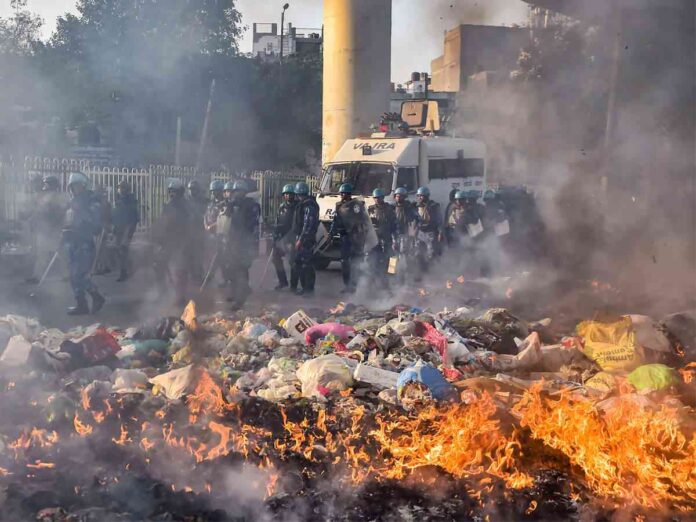A sessions court here has ordered framing of charges against eight accused for various offences, including murder, arson, and theft in a case pertaining to the 2020 northeast Delhi riots.
The eight were accused of being a part of the riotous mob that vandalised properties and attacked people of a particular community near Shiv Vihar Tiraha here on February 24, 2020.
According to the prosecution, a man named Rahul Solanki died after being shot by the mob, while the shop of Sanjeev Kaushik was vandalised and set ablaze.
” I find that Salman, Sonu Saifi, Mohd. Arif, Anish Qureshi, Sirajuddin, Mohd. Furkan, Mohd. Irshad, and Mohd. Mustaqueem are liable to be tried for offences punishable under sections 147 (rioting), 148 (rioting, armed with a deadly weapon), 153 A (punishment for promoting enmity between different groups on the ground of religion, race, place of birth, residence, language, etc.),” Additional Sessions Judge Pulastya Pramachala said in an order passed last week.
He also ordered framing of charges against them under sections 380 (theft in dwelling house) 427 (mischief causing damage of Rs 50 or upwards), 436 (mischief by fire or explosive substance with intent to destroy house, etc.) 450 (house-trespass in order to commit offence punishable with imprisonment for life) and 302 (murder) of the Indian Penal Code.
The accused were also liable to tried for the offences under sections 149 (every member of unlawful assembly guilty of offence committed in prosecution of common object) and 188 (disobedience to order duly promulgated by public servant) of the IPC, the judge said.
Further, three accused, Salman, Sonu Saifi and Mohd. Mustaqueem were charged under the provisions of the Arms Act, the judge added.
He said the evidence on record showed that the riotous mob engaged in vandalism, arson, firing gunshots etc. and its common object was obvious.
“The person who remained a member of this mob, remained voluntarily part of it, despite seeing the actions of this mob, which included mindless firing, pelting of stones, throwing petrol bombs at the group of Hindus and therefore, it cannot be assumed that firing at Rahul Solanki was solitary action of one individual, which had no connection with the common object of the aforesaid mob,” the judge said.
The court also said it was established during the probe that the mob also vandalised, looted and torched Kaushik’s shop and all the members of this mob, including the accused persons, were liable for committing the murder, vandalism and arson.
Only because other members of the mob could not be identified or traced, accused persons cannot take any benefit, the court said.
It said in the present case, “all accused indulged in targeting Hindus and their such acts were apparently prejudicial to the harmony between communities of Muslims and Hindus and they did disturb the public tranquillity through their actions.”
The court said evidence also showed that Salman and Mustaqueem fired gunshots and that at the instance of accused Sonu Saifi and Mustaqueem, one pistol each was recovered by the police.
It rejected the arguments for discharge of the accused, such as their CDR location, delay in sending the bullets to the forensic science laboratory (FSL), non-supply of the video of the postmortem, absence of test identification parade (TIP) of other accused persons except for Mustaqueem and the absence of a conclusive report from FSL regarding use of pistol recovered from Mustaqueem.
“I have considered all these contentions, but I do not find the discharge of any accused being made out on the basis of these contentions, in view of the evidence of identification of all the accused persons as part of the riotous mob,” the judge said.
The judge also said the delay in registration of the FIR in itself cannot be a ground for discharge as the delay is required to be explained and appreciated at the final stage of the trial.
The court, however, discharged all accused persons from sections 295 A (deliberate and malicious acts intended to outrage reli gious feelings of any class by insulting its religion or reli gious beliefs) and 120 B (criminal conspiracy) of the IPC.
“…On the basis of vague statements of the witnesses that this mob was abusing Hindus, I do not find sufficient material to apply my mind to infer if such abuse were with the intention to outrage the religious feelings or to insult the religion or the religious beliefs I also do not find any concrete evidence to show that all the accused persons along with others came on the road in pursuance to a criminal conspiracy hatched by them.” the court said.
Dayalpur police station had filed four supplementary chargesheets against the accused in the present court.




